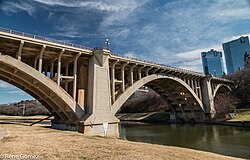Paddock Viaduct | |
 Paddock Viaduct in 2017 | |
| Location | Main Street, Fort Worth, Texas |
|---|---|
| Coordinates | 32°45′36″N 97°20′5″W / 32.76000°N 97.33472°W |
| Area | 3 acres (1.2 ha) |
| Built | 1912 |
| Built by | Hannan-Hickey Brothers[2] |
| Engineer | Brenneke and Fay[2] |
| NRHP reference No. | 76002068[1] |
| TSAL No. | 8200000575 |
| Significant dates | |
| Added to NRHP | March 15, 1976 |
| Designated TSAL | January 1, 1981 |
The Paddock Viaduct, also known as the Main Street Viaduct, is a reinforced concrete bridge spanning the Trinity River in Fort Worth, Texas. Low-water crossings and ferries originally provided the only access across the Trinity River at this location, connecting the downtown area of Fort Worth with northern sections of the city. A two-lane suspension bridge, constructed near this site in the 1890s, proved inadequate for the growing population. This span, designed by the St. Louis engineering firm of Brenneke and Fay, was completed in 1914.[2] It was the first reinforced concrete arch in the nation to use self-supporting, reinforcing steel. The bridge is named in honor of B. B. Paddock, former State Legislator and Mayor of the City (1980).
The bridge was built in 1913 and renovated in 1965 and 1988. It was added to the National Register of Historic Places on March 15, 1976.[1]
- ^ a b "National Register Information System". National Register of Historic Places. National Park Service. November 2, 2013.
- ^ a b c Jackson, Robert W. (August 1996). "Main Street Viaduct" (PDF). Historic American Engineering Record. Washington, D.C.: Library of Congress. Retrieved April 30, 2021.

